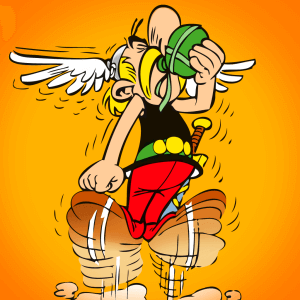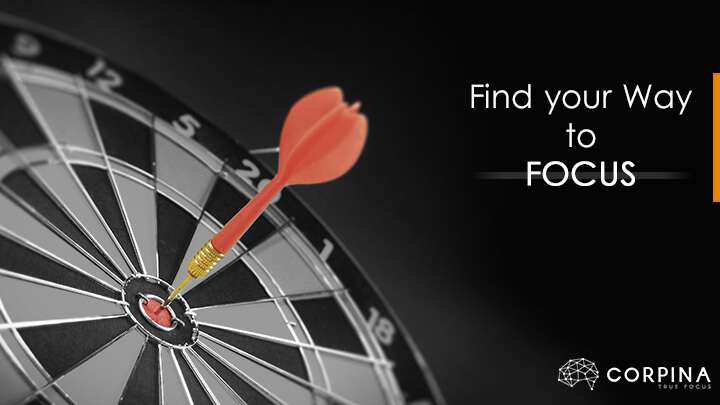7 Effective Over-the-Counter Medications For Focus and Concentration
Folklore has alluded to the existence of  ‘magic potions’ which can build superhuman strength, mental prowess, stamina, and reflexes.
‘magic potions’ which can build superhuman strength, mental prowess, stamina, and reflexes.
Have you ever wondered if these could ever be real? Asterix has ‘magic potion’(creative, right?), Popeye has spinach, Ironman has money… oh, wait… We’ll stop at Popeye for now.
I’m writing this to tell you that this is no fairy tale. I’m not talkin’ about some granny’s cure for cold, I’m talking about the real deal. When you think about it, there are a lot of things that we don’t know or we take for granted and refuse to believe.
Probably because our parents always taught us that there are no shortcuts to success and therefore we refuse to believe in all this hocus-pocus.
In this article:
So… nootropics?
Let’s get down to brass tacks. Or magic potions to be more precise. The ones I’m referring to of course are a branch of drugs called Nootropics. Also called smart drugs, these supplements can kick your brain into high gear and keep it there long enough for you to workout, finish stuff at work, rescue your neighbor’s cat, pick up your girl, cook dinner and still have energy left for romance.
There are a lot of different classes and types of nootropics available for consumption. There are several articles on this website that talk about them. I will concentrate on things that you can experiment with until you are confident to move on to more potent drugs. So we will start with stuff you can get more easily than the rest. So here is the list of over the counter medication to improve focus and concentration.
So, which over-the-counter nootropics are best for focus?
Medication for Concentration
First, let’s see what the prescription drugs are actually about and why you should start off with OTC varieties for now. To start off, these prescription drugs are prescribed for different cases. For example, Modafinil is prescribed for narcolepsy and sleep disorders.
 Their secondary effects were stumbled upon by accident. Drugs with off-label use are generally discouraged by doctors and the public. But this hasn’t stopped some people. Folks have been reporting a lot of intense positive cerebral sensations related to taking nootropics, and they’re verified by labs as well, so there is some truth to it.
Their secondary effects were stumbled upon by accident. Drugs with off-label use are generally discouraged by doctors and the public. But this hasn’t stopped some people. Folks have been reporting a lot of intense positive cerebral sensations related to taking nootropics, and they’re verified by labs as well, so there is some truth to it.
The way that these nootropic drugs work is by stimulating the central nervous system to release histamines. This triggers the body’s immune system to react promoting the feeling of ‘wakefulness’. But you have choices about how you want to trigger it.
Amphetamines aren’t the only way you can give your body the jump start it needs. You have the choice of naturally available nootropic supplements or a defibrillator kit. I wouldn’t recommend the kit if you have chest hair. Plus it can be expensive on utility charges.
But you should ease into any course of medicine involving your brain, and this is why I would recommend starting with natural variants and OTCs until your body is ready to accept more.
1. B-Complex Vitamins
These are simple enough to acquire and provide a decent boost to your mental faculties. You won’t turn into Einstein overnight, but trust me, the effects are quite significant. Also, since it’s natural, you won’t have a lot of bad side effects to worry about.
 There are required by the brain on an everyday basis. And because they’re water soluble, you don’t have to supplement this supplement with any other fat/oil based supplement for this supplement to take full effect. Did I mention supplements too many times?
There are required by the brain on an everyday basis. And because they’re water soluble, you don’t have to supplement this supplement with any other fat/oil based supplement for this supplement to take full effect. Did I mention supplements too many times?
They have a ton of benefits including helping your brain circulate more blood, increase your metabolism and increased focus and concentration. This increased focus is because of the fact that it promotes the production of acetylcholine in the body. Some of the more well-known vitamin B variants are Thiamine and Niacin. Both are said to have additional benefits like promoting regular sleep cycles.
Everyone’s daily diet has enough vitamins. But it’s altogether another issue as to whether your body is getting its fill of it. For example, to get your daily dose of B12, you need to consume about 8 pounds of red meat. While this might sound a very viable plan, spare a thought for your ballooning waistline. Supplements are easily the healthier way out.
2. Racetams
If drugs named RACEtams don’t get you excited, you my friend, are overworked and underpaid. Like its namesake, if you think popping vitamins just doesn’t do it for you, you need to get a load of this. This has proven focus altering properties that can bring about great change to how you approach life. It is known for its abilities to increase concentration, memory and neuroplasticity.
There are a lot of ‘flavors’ you could check out here on this website. A few of the more popular RACEtams (man, I love saying that word!) are:
3. Ampakines and Dopaminergics
There are these receptors called AMPA receptors in the brain. They work like satellite dishes, channeling essential compounds to increase neuroplasticity and synaptic transmission. Ampakines activate these dishes and help them catch better signals which in turn mean better brain function for you.
Dopaminergics are responsible for signaling dopamine receptors, producing dopamine-related effects. Dopamine is produced as a ‘reward’ by the brain for accomplishing something important and fulfilling. Like that time when you finally asked your crush to prom.
Dopaminergics taken as supplements help preserve these neurotransmitters by inhibiting re-uptake. Dopamine levels are directly proportional to your concentration, motivation, and mental energy levels.
4. Choline Supplements
I can recommend Choline with anything else you take. Why? Because it is synthesized by the body to acetylcholine, which in turn gives you access to better focus. Acetylcholine can give you benefits leading to better cognitive abilities even on a cellular level by promoting growth of new neurons.
Choline can be found in foods like eggs, meat and liver. But if you if you need enough to make it work, you’re gonna have to use supplementation to overcome this. Some really good sources of Choline are Acetyl L-Carnitine and Alpha GPC.
Natural Alternatives
1. Ginkgo Biloba
Ginkgo is extracted from the maidenhair tree (Ginkgo biloba). Since its natural, side effects are minimal.
This is one of the prime ingredients in many of these ‘brain booster pills’. It is also perhaps one of the widely used supplements for treating memory lapse. It’s also used to treat everything from depression, stress and loss of focus.
Ginkgo has powerful healing effects on people suffering from Alzheimer’s and dementia.
Studies have found that Ginkgo actually repairs brain cells and prevents further damage from mentally distressing conditions.
2. Bacopa Monnieri
Bacopa is found in the northern part of the Indian subcontinent. This herb is also known as water hyssop. It helps reduce stress and anxiety by stimulating various centers of cognitive ability in the brain. It is used in almost all nootropic stacks to improve memory and concentration in some users.
Strict double-blind placebo controlled clinical tests of this herb were carried out and it was found to have significant positive effects on improving memory and cognitive ability in a group of people.
3. Fish oil supplements
Fish oil has been consistently used and proven to be a great source of improving cognitive ability.
Research has uncovered that Omega-3 improves the level of healthy neurotransmitter activity in the brain. You can also use it in conjunction with fat-soluble nootropics as a supplement to help it dissolve.
Mental Exercises To Strengthen Your Focus and Attention
If you want to strengthen your mind and concentration, another thing you should consider is exercising your brain.
You need to think of your brain as a muscle.
It’s a part of your body that needs exercise by means of stimulation if you want to keep it functioning at its best. You should treat it just like you would your arms, abs, or legs.
Now, you may be thinking…how the heck do I exercise my mind?
Well, there are plenty of simple, scientifically-backed exercises you can do that will actually result in better brain function and performance. In fact, they could even aid in the improvement of your memory and provide a boost in concentration.
If you’re ready to give your mind a boost, try these exercises to strengthen your focus and concentration:
1. Meditation
Over the past few years there has been a surge in popularity of meditative practices. However, they aren’t being taken up just by the hippy culture anymore.
Meditation is making its way into the boardrooms of the corporate and tech elite. It has been proven to help fight against anxiety, stress, and depression — all things that are typically felt in the modern workplace.
Studies by Stanford University have confirmed that meditation can be used as a natural way to enhance dopamine production in the brain. Dopamine, as you may know, can help alleviate stressors such as anxiety and depression, while also leaving you in a state of euphoria.
While you likely won’t reap the benefits of meditation immediately, you should start noticing them after a few regular sessions. All it takes is 10 to 20 minutes per day and you’ll start to feel the difference.
If you’re having trouble with the technicalities of meditation, try an app such as Headspaceor Calm. Both offer guided meditation courses that help you get into a rhythm and stick to regular meditative practices.
2. Read Long Content Slowly (Resist the Urge to Skim)
When reading an article, you’ve probably found yourself skipping around from paragraph to paragraph, not reading and absorbing the full content.
This is an unfortunate side effect of being too distracted during the day. Because of all of this distraction, our minds want to rush through the information, gathering “bits and pieces” instead of the complete information.
This is nothing new. Ever since the advent of the internet, where information is endless to consume, it seems as though our brains are starting to rewire themselves to consume more.
But is that information truly sinking in? Researchers say it’s not.
Just like the “slow food” movement, which challenges people to eat slowly to help cut down on excess calories, you should take on the “slow reading” movement.
The next time you encounter a long-form piece of content, don’t just skim it. Commit to reading the article in its entirety and let it sink in. The best way to keep your mind strong is to stimulate it and consuming information is a great way to do that.
3. Take New Routes
If you want to strengthen your mind and concentration, one simple thing you can try is to change up the route you walk or drive on a daily basis.
The reason this works is because your brain isn’t accustomed to taking this path on a daily basis. It requires you to think and react in different ways than you normally would, thus activating new parts of your brain.
This was proven when researchers studied the brains of London taxi drivers. While many big city streets, such as New York, are arranged in a grid, London is not. In fact, it has no pattern or grid shape to it at all.
This requires London taxis to memorize each and every street in London to properly navigate. Constantly taking new routes allows these drivers to activate and stimulate their cortex and hippocampus.
This gives them more gray matter in their posterior hippocampi than people who were similar in age, education and intelligence, but who did not drive taxis.
4. Take Notes by Hand
If you’re a student or an employee who often takes notes on your laptop, it’s time to ditch the digital notetaking for handwritten notes.
This old-fashioned way of writing your thoughts down by hand requires your brain to slow down and concentrate on each point of the information you’re reading or hearing piece by piece.
Hand writing your notes may be one of the best ways to enhance your focus too. In a studyof 65 college students, they were asked to watch one of five TED Talks. These students were either given laptops or notebooks and told to take notes.
There were “distractors” throw at them during the note taking process. After the TED Talks and notetaking, they had to answer questions based on the video they watched.
While both the laptop and notebook groups performed well on questions recalling facts, the notebook group performed much better on the conceptual questions. What’s more is that, one week later, the notebook group was able to recall more information than the laptop group.
This goes to show that quicker note taking doesn’t necessarily mean better or similar retention of the information. To train your brain to retain more information, start taking notes by hand.
Final Thoughts
Like all things that affect your body, you should take care of what you put into it. Drugs can have great positive effects but equally devastating counter effects. You should be responsible enough to get in touch with a doctor or physician who has your medical history and can advise you on what you should be doing.
If I’ve managed to make you read this far and give you a glimpse of the immense possibilities that these drugs can give you, then I’ve accomplished what I set out to do. And hopefully, now you have a few alternative answers to your question of ‘is there an over the counter medicine for focus?’
The most important thing is that you want to better yourself and get on the path to achieve greater things.
I wish you success! Feel free to share your thoughts about nootropics below in the comments!

